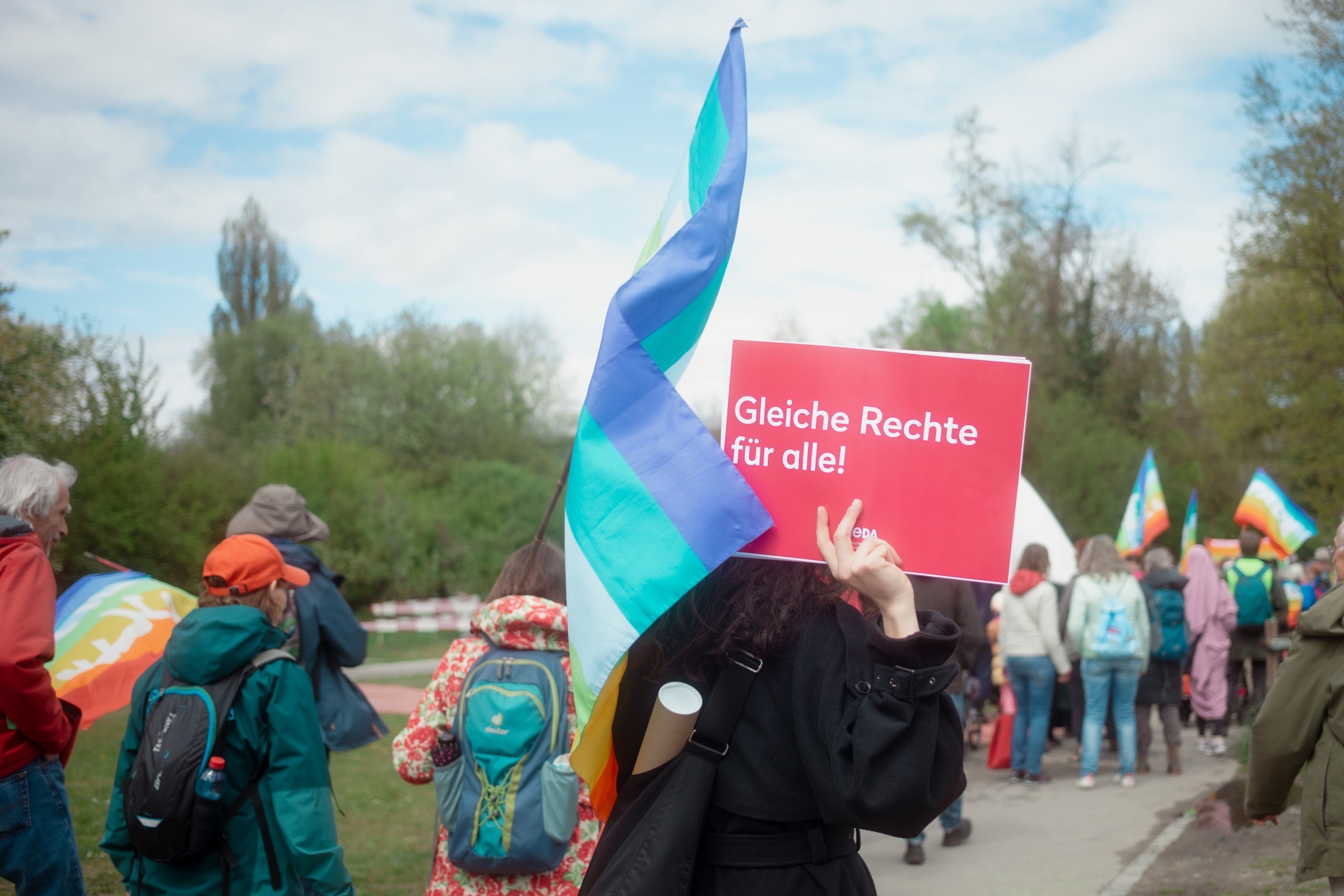Feminist peace policy
This page has been automatically translated. The German version is authoritative. Thank you for your understanding.
Feminist peace policy is committed to justice and equal rights for all people, regardless of their origin, their (biological and social) gender, their sexual orientation, their social status, their political or religious beliefs. The focus is on equal access to education, law, politics, resources and income.
Peace policy describes the endeavour to achieve the ideal state of peace in society. This includes peace movements as well as political, civil society, private and international initiatives for disarmament, demilitarisation, non-violence and conflict resolution. Feminist peace policy also uncovers all (structural) obstacles to the realisation of feminist peace in order to remove them. It pursues a human rights-based approach and develops solutions to eliminate poverty, conflicts and global injustices. It endeavours to consistently shape domestic and foreign policy processes as well as international development policy in a peace policy and feminist way.

To this end, feminist peace policy analyses the power structures and connections between poverty, conflict and economic and geopolitical interests. It points out global injustices, unequal distribution of resources and their structural causes. It identifies the responsibilities. It shows how power structures and inequalities affect people's everyday lives.
What does Frieda
Frieda starts from a broad and feminist concept of peace. This encompasses more than the absence of direct violence perpetrated by one or more actors, for example domestic violence, rape, armed conflict and threats. Positive peace also means the absence of structural and cultural violence; structural violence is violence that is reproduced by social, political and economic structures, i.e. violence that is "built into the system". This can be, for example, the oppression of certain social groups by systems such as colonialism and capitalism. Cultural violence are aspects of a society that legitimise direct and structural violence, for example homophobia, racism or militarism. For Frieda, positive or feminist peace means in particular the absence of gender-specific violence and gender-specific (multiple) discrimination. Gender is to be understood as a predominantly socially constructed category.
Frieda works on an individual and a structural-social level. The work on various levels aims to change the framework conditions and contribute to positive, comprehensive peace. Find out more about Frieda's way of working.

Topics and priorities
Frieda accompanies and monitors the implementation of government instruments in networks together with other civil society actors: for example in the Istanbul Convention network, in the civil society monitoring group of NAP1325, in the Agenda Platform 2030 (SDG 5 Gender Equality and SDG 16 Peace, Justice and Strong Institutions) and as a member of the NGO Coordination Post-Beijing. An essential part of this work is to point out existing gaps and develop possible measures:
Switzerland ratified the Istanbul Convention, the Council of Europe Convention on preventing and combating violence against women and domestic violence, and brought it into force on 1 April 2018. Together with over 70 NGOs and specialised agencies, Frieda, as the Istanbul Convention Network, is calling for the consistent, non-discriminatory and inclusive implementation of this international convention. In 2021, GREVIO, the monitoring body (Group of Experts on Action against Violence against Women and Domestic Violence), published the first alternative report by civil society on the implementation of the Istanbul Convention in Switzerland. Both the GREVIO report and the IC network report criticise the fact that Switzerland does not fulfil numerous requirements of the Convention. For example, non-discriminatory implementation is not guaranteed and there is a lack of financial and human resources.
The UN Women's Rights Convention CEDAW (Convention on the Elimination of All Forms of Discrimination against Women) was ratified by Switzerland in 1997. In a four-year cycle, states report to the CEDAW Committee on the status of implementation of the convention in their country. Switzerland is now in the cycle of the 6th state report, which was submitted at the end of November 2020. The NGO Coordination post Beijing Switzerland, a civil society network of 50 organisations, including Frieda, critically monitors the implementation of CEDAW in Switzerland and prepares an alternative report to the Swiss state report. Here, too, gaps in Swiss measures in favour of gender equality are listed and corresponding recommendations formulated. For example, the inadequate protection against gender-based violence is pointed out.
The 2030 Agenda Platform is a network of over 50 associations, organisations, NGOs and trade unions in Switzerland, of which Frieda is also a member. The 2030 Agenda Platform is committed to ensuring that Switzerland implements the 2030 Agenda with its 17 Sustainable Development Goals (SDGs). Frieda contributed to the assessment of SDGs 5 (gender equality) and 16 (peace, justice and strong institutions) as part of the shadow report. These two development goals are important for all of Frieda's work priorities, both in international cooperation and in the context of its engagement in Switzerland. Gaps in Switzerland with regard to the achievement of SDG 5 and 16 include the areas of economic participation and social and political participation.
The UN Resolution 1325 on women, peace and security is interpreted by Switzerland primarily as a foreign policy instrument and according to a narrow, militarised understanding of peace. Together with KOFF and Peacewomen across the globe PWAG, Frieda is conducting a civil society project to accompany the implementation of the current National Action Plan NAP. The project gathers voices and experiences from civil society and draws up recommendations for the next NAP. The accompanying project endeavours to turn the UN resolution into an instrument of positive peace and to draw attention to the domestic political dimension.
Useful links
Explanation of terms
Important terms at a glance: